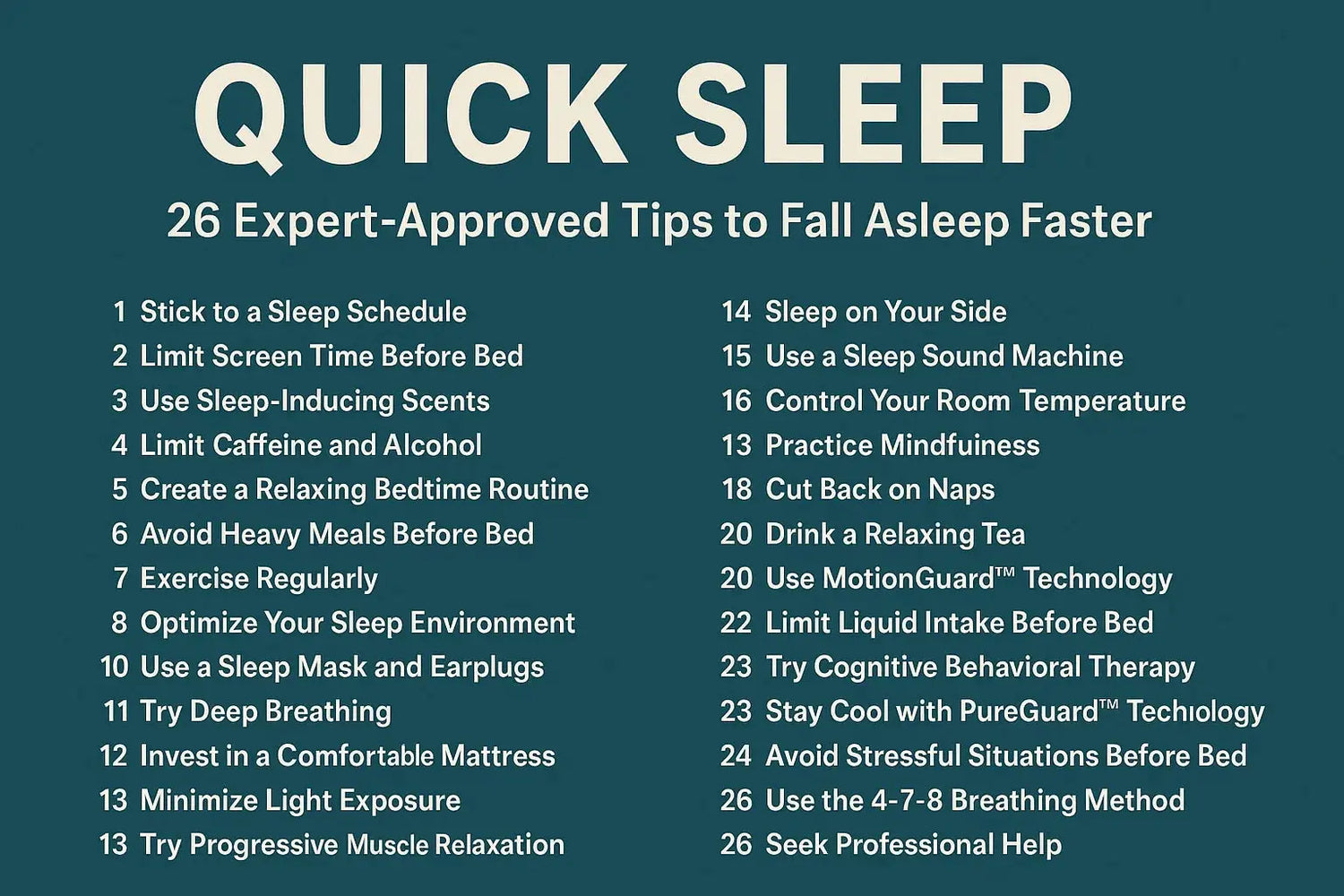
Struggling to fall asleep? Whether you’re dealing with stress, insomnia, or just a busy mind, getting a good night’s rest doesn’t have to be a challenge. Here are 26 expert-backed tips to help you fall asleep quickly and wake up refreshed.

26 Expert Tips for Sleeping
- Stick to a Sleep Schedule: Go to bed and wake up at the same time every day to regulate your body’s internal clock.
- Limit Screen Time Before Bed: The blue light from phones and computers can mess with your circadian rhythm.
- Use Sleep-Inducing Scents: Lavender and chamomile essential oils can calm your mind and help you sleep.
- Limit Caffeine and Alcohol: Avoid consuming caffeine or alcohol at least 4-6 hours before bedtime.
- Create a Relaxing Bedtime Routine: A warm bath or reading can prepare your body for sleep.
- Avoid Heavy Meals Before Bed: Large meals can cause discomfort and keep you awake.
- Exercise Regularly: A daily workout can help you fall asleep faster, but avoid vigorous activity right before bed.
- Optimize Your Sleep Environment: Make sure your bedroom is cool, dark, and quiet.
- Use a Sleep Mask and Earplugs: Block out light and sound for a peaceful sleep.
- Try Deep Breathing: Breathing exercises help to reduce stress and relax your body.
- Invest in a Comfortable Mattress: A good mattress can improve your sleep quality, such as the Anmiz-Y™ mattress, designed for comfort and pressure relief.
- Minimize Light Exposure: Avoid bright lights and electronics in the evening to signal to your body that it’s time to wind down.
- Try Progressive Muscle Relaxation: Tense and relax muscles from head to toe to release physical stress.
- Sleep on Your Side: This position can reduce snoring and help you breathe more easily.
- Use a Sleep Sound Machine: White noise or soothing sounds can mask disruptive noises and help you relax.
- Control Your Room Temperature: A cool room temperature around 60-67°F is optimal for sleep.
- Practice Mindfulness: Meditation or mindfulness exercises can calm your thoughts and help you sleep faster.
- Cut Back on Naps: Long naps can make it harder to fall asleep at night.
- Drink a Relaxing Tea: Herbal teas like valerian root or chamomile can be calming.
- Use MotionGuard™ Technology: Eliminate sleep disruptions caused by movement with a mattress that isolates motion.
- Limit Liquid Intake Before Bed: Avoid waking up for bathroom trips by limiting drinks before bedtime.
- Try Cognitive Behavioral Therapy: CBT is a proven treatment for insomnia, focusing on changing negative sleep patterns.
- Stay Cool with PureGuard™ Technology: Opt for a mattress with cooling technologies to avoid overheating during sleep.
- Avoid Stressful Situations Before Bed: Take the time to unwind and clear your mind before sleep.
- Use the 4-7-8 Breathing Method: Breathe in for 4 seconds, hold for 7, and exhale for 8 to relax your nervous system.
- Seek Professional Help: If sleep problems persist, consult a doctor or sleep specialist.
Suggested Table
| Tip | Description |
| Sleep Schedule | Stick to the same bedtime and wake-up time daily to regulate your circadian rhythm. |
| Optimize Mattress | Invest in a high-quality mattress with advanced sleep technologies like Anmiz-Y™ for better comfort and spinal support. |
| Relaxation Techniques | Use progressive muscle relaxation and deep breathing to reduce stress and prepare your body for sleep. |
| Sleep Sound Environment | Block out distractions with sleep sounds or earplugs to ensure a quiet, peaceful sleep. |
| Motion Isolation | Utilize MotionGuard™ technology for undisturbed sleep if you share a bed with a restless sleeper. |






